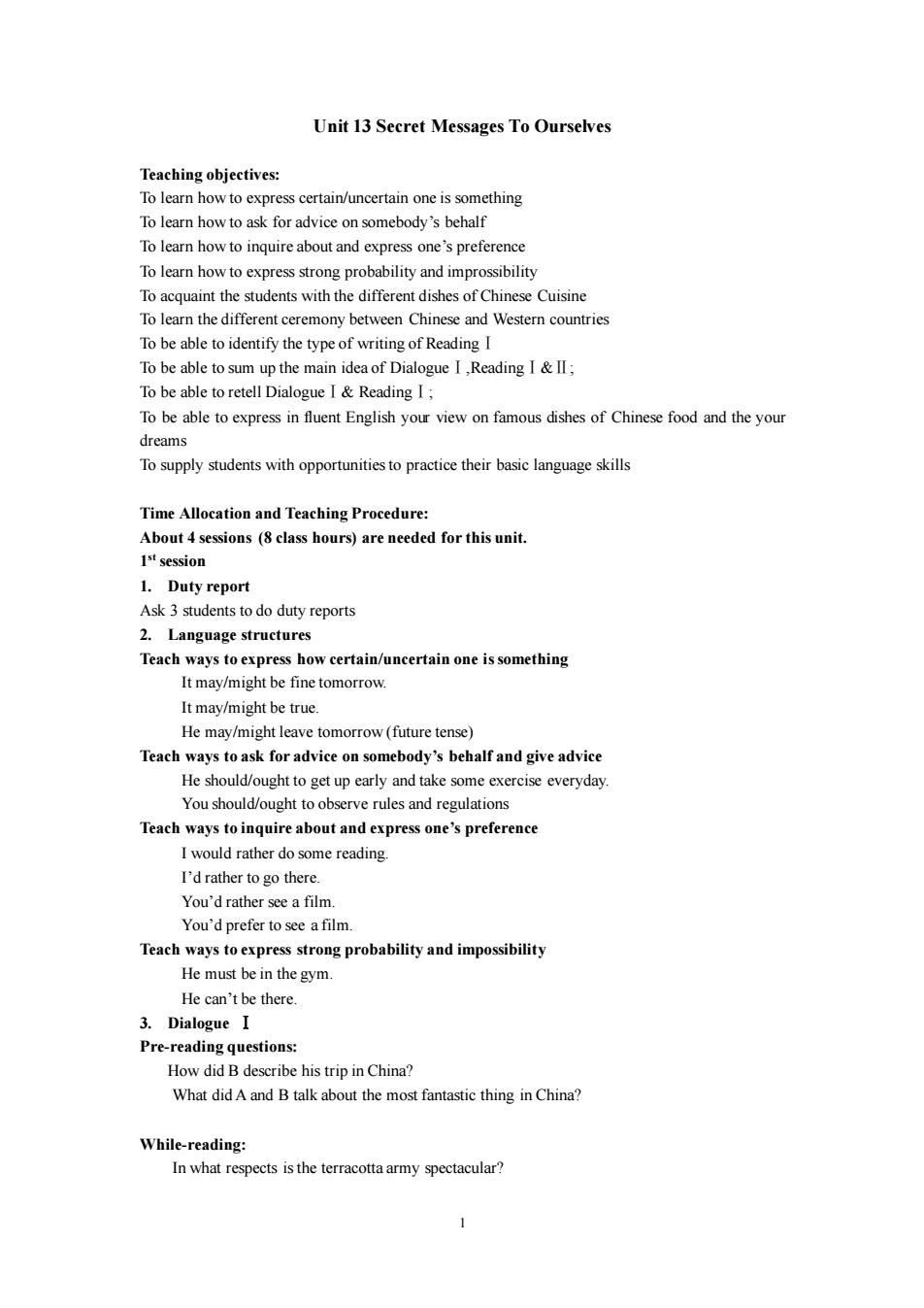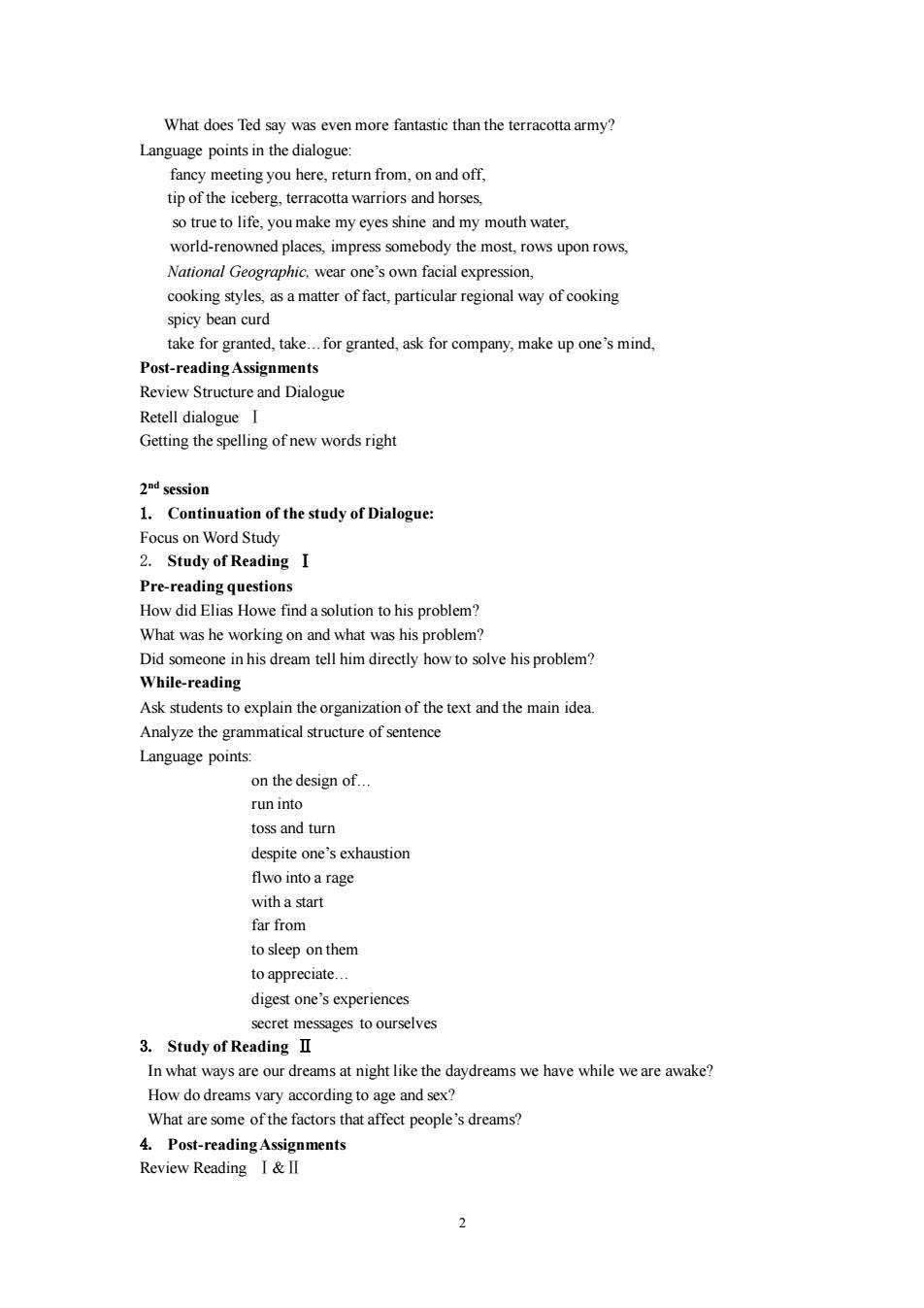
Unit 13 Secret Messages To Ourselves Teaching objectives: To learn how to express certain/uncertain one is something To learn how to ask for advice on somebody's behalf To learn how to inquire about and express one's preference Tolearn how to express rong probability and the students with the different dishes of Ch To learn the different ceremony between Chinese and Western countries To be able to identify the type of writing of Reading I To be able to sum up the main idea of Dialogue I,Reading I&l To be able to retell Dialogue I Reading I To be able to express in fluent English your view on famous dishes of Chinese food and the your dreams To supply students with opportunities to practice their basic language skills Time Allocation and Teaching Procedure: About 4 sessions(8class hours)are needed for this unit. Ask3 students to do duty reports 2.Language structures Teach ways toexpress how certain/uncertain one issomething It may/might be fine It may/might be true He may/might leave tomorrow (future tense) Teach ways to ask for advice on somebody's behalf and give advice He should/ought to get up early and take some exercise everyday You should/ought to o erulesand regulation Teach ways to inquire about and express one's preference I would rather do some reading I'd rather to go there. You'd rather see a film You'd prefer to see a film Teach ways probability and impossibility He must be in the gym He can't be there. 3.Dialogue I Pre-reading questions: How did B describe his trip in China? What didAand about the most fantastic thing in China While-reading: In what respects is the terracotta army spectacular?
1 Unit 13 Secret Messages To Ourselves Teaching objectives: To learn how to express certain/uncertain one is something To learn how to ask for advice on somebody’s behalf To learn how to inquire about and express one’s preference To learn how to express strong probability and improssibility To acquaint the students with the different dishes of Chinese Cuisine To learn the different ceremony between Chinese and Western countries To be able to identify the type of writing of ReadingⅠ To be able to sum up the main idea of DialogueⅠ,ReadingⅠ&Ⅱ; To be able to retell DialogueⅠ& ReadingⅠ; To be able to express in fluent English your view on famous dishes of Chinese food and the your dreams To supply students with opportunities to practice their basic language skills Time Allocation and Teaching Procedure: About 4 sessions (8 class hours) are needed for this unit. 1 st session 1. Duty report Ask 3 students to do duty reports 2. Language structures Teach ways to express how certain/uncertain one is something It may/might be fine tomorrow. It may/might be true. He may/might leave tomorrow (future tense) Teach ways to ask for advice on somebody’s behalf and give advice He should/ought to get up early and take some exercise everyday. You should/ought to observe rules and regulations Teach ways to inquire about and express one’s preference I would rather do some reading. I’d rather to go there. You’d rather see a film. You’d prefer to see a film. Teach ways to express strong probability and impossibility He must be in the gym. He can’t be there. 3. Dialogue Ⅰ Pre-reading questions: How did B describe his trip in China? What did A and B talk about the most fantastic thing in China? While-reading: In what respects is the terracotta army spectacular?

What does Ted say was even more fantastic than the terracotta army? Language points n the dialogue fancy meeting you here,return from,on and off. tip of the iceberg,terracotta warriors and horses. so true to life,you make my eyes shine and my mouth water. world-renowned places.impress somebody the most.rows upon rows Natonal Geographic wear ne's own facial expression cooking styles,as amatter of fact,particular regional way of cooking spicy bean curd take for granted,take.for granted,ask for company,make up one's mind, Post-reading assignments Review structure and dialogu Getting the spelling of new words righ 2d session 1.Continuation of the study of Dialogues ling I Pre-reading questions How did Elias Howe find a solution to his problem? What was he working on and what was his problem? Did som inhis dream tell him directly howto ehis problem? While-reading Ask students to explain the organization of the text and the main idea Analyze the grammatical structure of sentence Language points: on the design of. un into toss and turn despite one's exhaustion flwo into a rage with a start far from to sleep on them to appreciate. digest one's experiences secret messages to ourselves 3.Study of ReadingⅡ In what ways are our dreams at night like the daydreams we have while we are awake? How do dreams vary according to age and sex What are some of the factors that affect people's dreams? 4.Post-reading Assignments Review Reading I&Ⅱ 2
2 What does Ted say was even more fantastic than the terracotta army? Language points in the dialogue: fancy meeting you here, return from, on and off, tip of the iceberg, terracotta warriors and horses, so true to life, you make my eyes shine and my mouth water, world-renowned places, impress somebody the most, rows upon rows, National Geographic, wear one’s own facial expression, cooking styles, as a matter of fact, particular regional way of cooking spicy bean curd take for granted, take.for granted, ask for company, make up one’s mind, Post-reading Assignments Review Structure and Dialogue Retell dialogue Ⅰ Getting the spelling of new words right 2 nd session 1. Continuation of the study of Dialogue: Focus on Word Study 2. Study of Reading Ⅰ Pre-reading questions How did Elias Howe find a solution to his problem? What was he working on and what was his problem? Did someone in his dream tell him directly how to solve his problem? While-reading Ask students to explain the organization of the text and the main idea. Analyze the grammatical structure of sentence Language points: on the design of. run into toss and turn despite one’s exhaustion flwo into a rage with a start far from to sleep on them to appreciate. digest one’s experiences secret messages to ourselves 3. Study of Reading Ⅱ In what ways are our dreams at night like the daydreams we have while we are awake? How do dreams vary according to age and sex? What are some of the factors that affect people’s dreams? 4. Post-reading Assignments Review Reading Ⅰ&Ⅱ

Retell Reading I Getting the spelling of new wordsrigh Prepare the post-reading topics for discussion and writing 3dsession 1.Duty report 2.Cone ion of the study Reading I: Focus Word Sudy 3.Post-reading topic discussion Discuss the topics assigned in the previous session in pairs or groups,then the representatives do a presentation 4.Post- adin 4 session 1.Workbook:student book p.153-Guided writing.Work book pp.122-130 2.Quiz 3.Assignments: Complete the supplementary Do supplementary reading Preview the next unit 3
3 Retell ReadingⅠ Getting the spelling of new words right Prepare the post-reading topics for discussion and writing 3 rd session 1. Duty report Ask 3 students to do duty reports 2. Continuation of the study Reading Ⅰ: Focus on Word Study 3. Post-reading topic discussion Discuss the topics assigned in the previous session in pairs or groups, then the representatives do a presentation 4. Post-reading assignments student book p.153-Guided writing, Work book pp. 122-130 4 th session 1. Workbook: student book p.153-Guided writing, Work book pp. 122-130 2.Quiz 3.Assignments: Complete the supplementary written exercise Do supplementary reading Preview the next unit